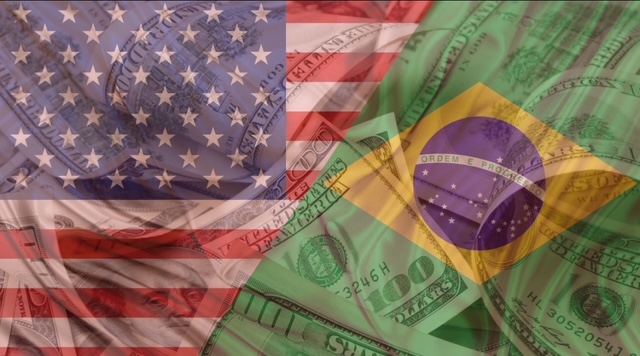President Donald J. Trump has threatened to impose a new round of tariffs and sanctions against Brazil after Brazil’s Supreme Court sentenced the former far-right president Jair Bolsonaro to 27 years in prison for attempting a coup — an act of political retaliation that should raise alarm bells across the globe.
President Trump’s threat follows the earlier imposition of a 50% tariff on Brazilian goods and Magnitsky sanctions on Brazilian Supreme Court Justice Alexandre de Moraes, who presided over Bolsonaro’s trial. These measures are designed to punish Brazil’s judiciary for daring to prosecute Bolsonaro, who plotted to overturn the 2022 elections and assassinate then-president-elect Luiz Inácio Lula da Silva.
In effect, Washington is attempting to coerce a foreign court into reversing a domestic legal process. For a U.S. president to sanction another country’s judges for convicting his political ally is unprecedented—and a direct attack on sovereignty and the rule of law. As a scholar whose work explores the intersections of law, colonialism, and crisis throughout history, I can tell you this charts a dangerous path.
The U.S. has long relied on economic warfare as an instrument of coercion in Latin America and the Caribbean. Cuba, Nicaragua, and Venezuela have endured decades of sanctions, embargoes, and restrictions under the banner of promoting democracy. In practice, these measures have devastated civilian populations while failing to produce meaningful political change. The U.S. embargo on Cuba, now over 60 years old, has deprived generations of basic goods and medicines without bringing about the regime change Washington once promised.
But Trump’s Brazil tariffs point to something new. Tariffs, traditionally tools of trade policy, are now being openly weaponized as instruments of political punishment and coercion worldwide. This is not simply about trade or diplomacy; it marks a new phase of U.S. economic warfare.
Supporters of sanctions and tariffs argue that economic pressure is preferable to direct military intervention. However, this framing obscures the reality: sanctions do indeed kill. They disrupt access to food, medicine, and critical supplies, plunging populations into crisis. In Venezuela, U.S. sanctions contributed to tens of thousands of excess deaths in a single year. In Cuba, restrictions blocked humanitarian aid during the COVID-19 pandemic, exacerbating suffering at the height of a global health emergency.
By 2024, one-third of the world’s population lived under some form of sanctions regime, with the U.S. responsible for more than 80% of unilateral measures.
These sanctions are rooted in emergency powers, which entail an anti-democratic decision-making process. The International Emergency Economic Powers Act of 1977 (IEEPA) allows the president to declare a “national emergency” and impose sanctions without congressional approval. The IEEPA has been invoked nearly 70 times, with 39 ongoing declarations still in effect. Courts have recently found that tariffs imposed under IEEPA are unconstitutional, yet the Trump administration continues to rely on this tool to justify sweeping interventions.
The legality of economic warfare is also contested in international law. Legal scholars have noted that sanctions violate the UN Charter, the Organization of American States Charter, Word Trade Organization rules, and international human rights law. More importantly, they erode the very idea of international legality by replacing global norms with U.S. domestic law.
Economic warfare is often portrayed as targeted, aimed at specific individuals or sectors. In reality, its effects are broad.
Exclusion from the U.S. banking system deters global financial institutions from engaging with sanctioned nations, effectively forcing international compliance. The result is over-compliance: banks and corporations cut off even legitimate or humanitarian transactions out of fear of U.S. penalties. The chilling effect leaves hospitals without medical equipment, schools without supplies and families without remittances.
Brazil now risks being pulled into this machinery of economic warfare. Tariffs and sanctions in retaliation for a domestic judicial ruling signal a dangerous expansion of U.S. contemporary interventionism. This is a form of collective punishment meant not only to discipline Brazil, but to send a message across the hemisphere: Prosecute U.S.-aligned leaders, and you will pay the price.
U.S. interventionism in Latin America is neither new nor accidental. From the Monroe Doctrine to Cold War interventions, Washington has repeatedly subordinated regional sovereignty to its own interests. What is different today is the legal form. Where once the U.S. sent Marines or backed coups, it now uses sanctions, tariffs and financial coercion to achieve geopolitical control over the region.
For Brazil, the stakes are immense. Its judiciary has acted to hold a former president accountable for attacks on its democracy. To punish that decision is to undermine not just Brazil’s sovereignty but the principle of judicial independence everywhere. For Latin America, this episode serves as another reminder that U.S. interventionism has not disappeared; it has been refashioned through the tools of economic warfare.
Sanctions kill, and yet they persist as key instruments of U.S. foreign policy and economic warfare. To challenge their legitimacy requires moving beyond the legal and political fiction that sanctions and tariffs are legitimate tools of foreign policy. They are weapons of economic coercion that harm the most vulnerable, erode international law, and perpetuate a system of global inequality.
For too long, the U.S. has claimed the right to decide the political futures of Latin America and the Caribbean. The latest tariffs and sanctions on Brazil make clear: unless confronted, this cycle of intervention will continue. But history offers another lesson: Latin America has resisted before, and it will resist again.
Jose Atiles is an associate professor of Criminology, Law and Society at the University of Illinois, a Public Voices Fellow of the OpEd Project and the author of “Crisis by Design: Emergency Powers and Colonial Legality in Puerto Rico,” which analyzes the role of law, emergency powers, and colonial structures in producing and exacerbating political and economic emergencies.
If you have an idea for an Opinion-Editorial piece, please send your ideas to Info@LatinoNewsNetwork.com for consideration.
